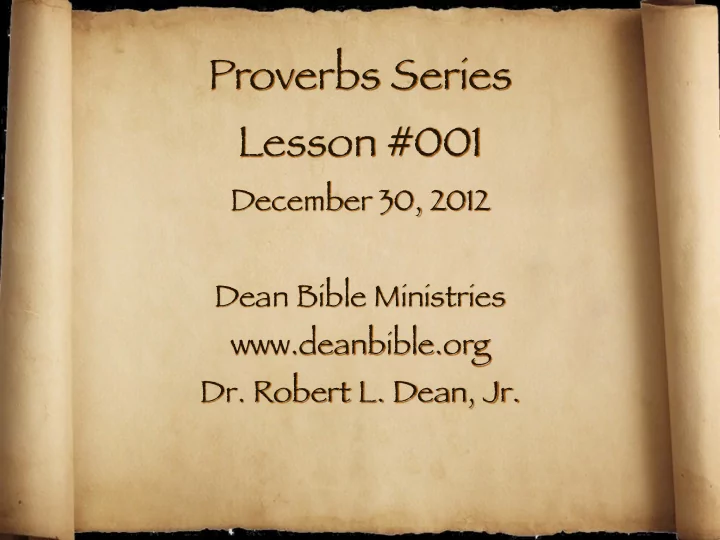

Proverbs Series Lesson #001 December 30, 2012 Dean Bible Ministries www.deanbible.org Dr. Robert L. Dean, Jr.
Proverbs Guide for Skillful Living
Proverbs is a collection of wise sayings, many taught by David to his son Solomon.
Title Prov. 1:1, “The proverbs of Solomon the son of David, king of Israel:”
Title Prov. 1:1, “The proverbs of Solomon the son of David, king of Israel:” • Hebrew Title: Mishle Shelomah or the “Proverbs of Solomon.” • LXX entitles the book Paroimiai Salamantos , “Proverbs of Solomon.” • The Vulgate’s title, Liber Proverbiorum or “the Book of Proverbs.” • Rabbinical writings cited the book as: Sepher Hokmah , “the Book of Wisdom.” • English “Book of Proverbs” derives from the Latin title.
Proverbs Outline I. Introduction: It’s All About Wisdom (1:1–9:18) II. Solomon’s Proverbs (10:1–22:16) 375 Proverbs III. The Thirty Sayings of the Wise (22:17–24:22) IV. Further Sayings of the Wise (24:23–34) V. More Proverbs from Solomon (25:1–29:27) 137 Proverbs VI. The Sayings of Agur son of Jakeh (30:1–33) VII. The Sayings of Lemuel (31:1–31)
Author: Several: Solomon (Prov. 1:1; 10:1; 25:1) David (taught Solomon) Agur (Prov. 30) Lemuel (Prov. 31:1–10)
1. Solomon wrote 3,000 proverbs (1 Kings 4:32) but also asked for (1 Kings 3:5 – 9) and received (1 Kings 4:29 – 31) divine wisdom. 1 Kings 4:32, “He spoke three thousand proverbs, and his songs were one thousand and five.”
2. His wisdom was superior to that possessed by all of the wise men of the East and Egypt (1 Kings 4:30).
3. Solomon was internationally renowned for his wisdom. Foreigners came from many miles to learn from his wisdom (1 Kings 4:34; 10:1–13, 24). 1 Kings 4:34, “And men of all nations, from all the kings of the earth who had heard of his wisdom, came to hear the wisdom of Solomon.” 1 Kings 10:24, “Now all the earth sought the presence of Solomon to hear his wisdom, which God had put in his heart.” (cf., 1 Kings 10:1–13)
4. Solomon’s wisdom, which was derived from God, was only exceeded by the wisdom possessed by Christ. Matt. 12:42, “[Jesus said] The queen of the South will rise up in the judgment with this generation and condemn it, for she came from the ends of the earth to hear the wisdom of Solomon; and indeed a greater than Solomon is here.”
5. The book’s fifth section (Prov. 25–29), was originally authored by Solomon. These proverbs were also collected and edited by Hezekiah’s sages (25:1).
Date Solomon probably wrote this near the middle of his life, before his fall into spiritual rebellion ( ca . 950 BC ). The later passages, related to Hezekiah’s sages, would have been written during that reign, 714–686 BC . The rest is difficult to date with any precision.
Hebrew Wisdom Poetry
Hebrew Wisdom Poetry Proverbs is didactic poetry—teaches principles about life by means of maxims (Proverbs, Ecclesiastes).
Hebrew Wisdom Poetry Proverbs is didactic poetry—teaches principles about life by means of maxims (Proverbs, Ecclesiastes). Hebrew poetry is not based on assonance (rhyme) or meter. The real key to this kind of poetry is parallelism, which involves the “rhyming” of ideas through careful arrangement of parallel thoughts.
1. Synonymous parallelism. The second line reinforces the thought of the first by using similar words and concepts (Prov. 11:7, 25; 12:28).
Prov. 1:2, “To know wisdom and instruction, To perceive the words of understanding,” Prov. 11:25, “The generous soul will be made rich, And he who waters will also be watered himself.” Prov. 12:28, “In the way of righteousness is life, And in its pathway there is no death.”
2. Synthetic parallelism. The second line adds to or completes the idea of the first line. Prov. 4:23, “Keep your heart with all diligence, For out of it spring the issues of life.”
3. Antithetic parallelism. The thought of the first line is contrasted in the second line. Prov. 10:1, “The proverbs of Solomon: A wise son makes a glad father, But a foolish son is the grief of his mother.” Prov. 14:34, “Righteousness exalts a nation, But sin is a reproach to any people.” Prov. 15:1, “A soft answer turns away wrath, But a harsh word stirs up anger.”
There are Four Ways People Handle Problems: 1. They IGNORE the problem and hope it will someday resolve itself without any focused effort or embarrassment. Often this is rationalized as putting something in God’s hands, but often we have to put something in God’s hands, which means facing realities and using our spiritual weapons to defeat the enemies of our sin nature. 2. They can’t ignore it, so they address it with as MINIMAL A RESPONSE as possible to avoid really facing the significant spiritual issues, and other related unpleasant realities. 3. They try somewhat, then GIVE UP. 4. They FACE the problem honestly and straight up until the problem is resolved using God’s divine principles and promises.
Prov. 1:2, “To know wisdom and instruction, To perceive the words of understanding,”
Wisdom ( hokmah ) = skill for living Instruction ( musar ) = disciplined education, involving correction and rebuke.
Recommend
More recommend